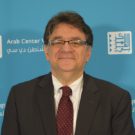Speakers

Trita Parsi
Executive Vice President
Quincy Institute for Responsible Statecraft

Assal Rad
Research Director
National Iranian American Council

Barbara Slavin
Director of the Future of Iran Initiative and Nonresident Senior Fellow
Atlantic Council
Moderator
About the Webinar
On September 8, Arab Center Washington DC (ACW) hosted a webinar titled “A Renewed Iran Nuclear Deal: Prospects, Challenges, and Global and Regional Implications.” Panelists were Trita Parsi, Executive Vice President at the Quincy Institute for Responsible Statecraft; Assal Rad, Research Director at the National Iranian American Council; Barbara Slavin, Director of the Future of Iran Initiative and Nonresident Senior Fellow at the Atlantic Council; and Kristian Coates Ulrichsen, Nonresident Senior Fellow at Arab Center Washington DC and Baker Institute Fellow for the Middle East at Rice University. Daniel Brumberg, Nonresident Senior Fellow at Arab Center Washington DC and Associate Professor and Director of Democracy and Governance Studies at Georgetown University, moderated the event.
Trita Parsi expressed pessimism that a new deal can be reached on Iran’s nuclear program. He also said that if one were to be reached, it would be more fragile than the JCPOA for three specific reasons: abundant mistrust between the United States and Iran, major flaws that cannot be addressed in a new deal, and a changing regional and global geopolitical environment.
- On mistrust, Parsi said, “The issue of trust and lack of it has been haunting US-Iran relations for more than four decades and has probably never been as bad…as it has been in some of the worst episodes in US-Iran history.”
- With the changing geostrategic picture and the perception of receding American influence around the world, Parsi said that, “The Iranians are now seeing that the Chinese and the Russians are much more willing than they were before because of the all-rising tensions with the United States to protect Iran.”
Assal Rad discussed the distinct preferences of the Iran political establishment and those of the Iranian people, stating that the radicals in the Iranian regime are similar to hawks in the United States who stand firmly against the deal. But the Iranian people, she said, have always been open to reaching a deal on the nuclear program because they want to have open relations with countries around the world.
- Looking at Iranian hardliners, she stated that, “The Raisi administration is different than its predecessor because it is pivoting away from this idea of engagement with the west,” and is turning instead to China, Russia, and potential regional allies.
- As for the Iranian people, Rad said that, “It is not surprising to note that support for the deal within Iran has waned over the years because their opinions of the deal are based on the context of how the deal benefits them.”
Kristian Coates Ulrichsen discussed various Gulf states’ concerns regarding the current negotiations, as well as what will come afterward in terms of regional relationships. He also spoke about the impact of US “hedging” in the nuclear talks, the significance of Saudi Arabia and the UAE’s direct negotiations with Iran on other issues, and the role of the Abraham Accords.
- Regarding the Gulf states’ view of the deal, Ulrichsen said, “The mood in the Arab Gulf has shifted away from assuming that the deal would be done…to now thinking about what this means if there’s no deal.”
- And on the same topic, he said, “We see Gulf Arab countries now making their own sets of accommodations and arrangements just to make sure that they project their own interests.”
Barbara Slavin highlighted the key role that the United States’ domestic concerns play in negotiations, especially with the US midterm elections rapidly approaching. She also emphasized what she called Iran’s counterproductive negotiation tactics and its domestic, regional, and global activities. Slavin also spoke of the factor of broader regional concerns in Syria, Iraq, and Yemen.
- On US perception of Iran, Slavin argued that due to incidents such as terrorist plots and the recent attack on Salman Rushdie, neither side of the political aisle views Iran favorably at the moment, saying, “In this atmosphere, you can see that the Biden administration is in no rush to be making new concessions.”
- On the possibility of achieving a deal, Slavin stated, “If we are lucky enough to get this back… we will not be feeling any sense of euphoria; we will be feeling, rather, a sense of relief that the nuclear file has been temporarily stabilized.”


